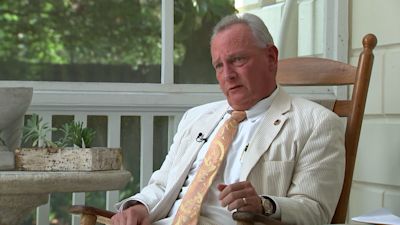Can America's southern states shake off their racist past?

Joe Ringhoffer invited me into his home in the centre of Mobile, Alabama, and we sat down to talk on the verandah, looking out on his back garden.
He was immaculately dressed in a seersucker suit, a pin bearing the Confederate flagproudly displayed on his lapel.
I asked him whether he ever felt like America had moved on and left him behind.
"I’ve been feeling that way for some time," he replied.
Policing in Detroit: A story of tension, grievances, and hope
US police not treated fairly, claims Donald Trump after Rayshard Brooks fatal shooting
Mr Ringhoffer is the local representative of the Sons of Confederate Veterans.
He explained to me his organisation exists to promote "the good name" of Confederate soldiers, and maintain the monuments and gravestones which mark their sacrifice.
This cause puts Mr Ringhoffer squarely at odds with the wave of protests which have crashed across this country since the killing of George Floyd by police officers in Minneapolis almost four months ago.
Protests in which statues of Confederate military commanders have been attacked, or simply removed by the local authorities.
The statues are seen by demonstrators as blights on their towns and cities, monuments to America’s racist past and a reminder of an era in which hundreds of thousands of African-Americans were enslaved.
The Confederate states fought to preserve slavery in the American civil war.
For this direct descendant of a Confederate soldier, the Black Lives Matter movement is a "terrorist organisation", characterised by "vandalism, violence and outright lawlessness".
I suggested to Mr Ringhoffer that removing these statues was about fairness, and reconciliation, and creating a more peaceful future for the United States and all of its citizens.
"I don’t know what fairness denies a man his heritage," he replied.
"I’m not willing to give up my heritage. I’m not going to turn my back on my ancestors because somebody anywhere in this country thinks it is an evil or oppressive symbol."
In Mobile itself, a statue of one of his heroes, a Confederate naval commander, Admiral Raphael Semmes, was removed from its plinth in the centre of the city and put in a museum by the mayor earlier this summer.
"He broke state law by taking down a statue that had been there for 120 years," says Mr Ringhoffer.
It’s difficult to know how many Americans share these views. One of them certainly does. President Donald Trump has bemoaned the loss of these "beautiful" monuments.
He says it’s "only a matter of time" before left-wing activists start demanding the removal of statues of George Washington and Thomas Jefferson - because they owned slaves.
Hundred and sixty years since the end of the civil war, America is still reckoning with its legacy, fought over on new battlefields in the modern "culture war".